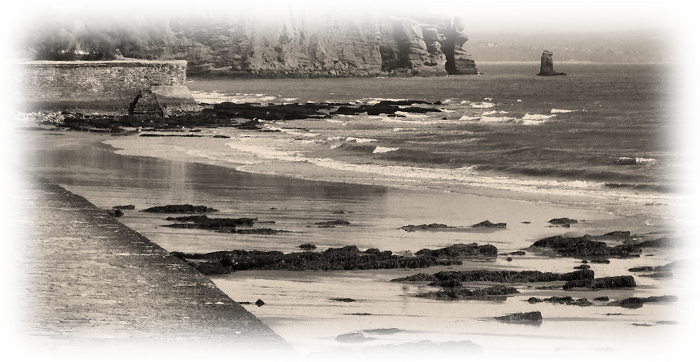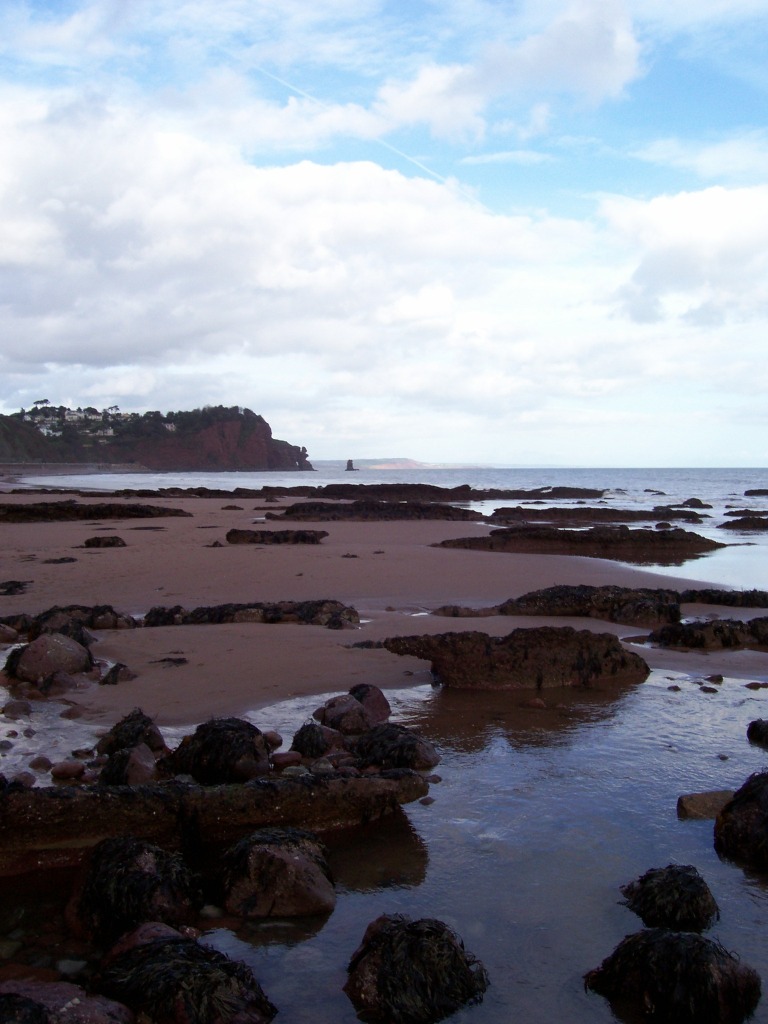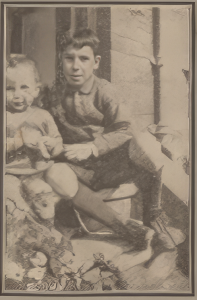The sea takes its toll. Teignmouth has had its fair share of tragic incidents over the years by virtue of its association with sea as a working port on an estuary and historically as a ‘watering place’ and subsequent popular seaside resort. The previous two posts illustrated the perils of working with the sea; this post reflects the dangers of underestimating the power of the sea when simply trying to enjoy yourself. The story has been put together from a number of newspaper reports from the time [1].
It was on Friday 5th August 1921 that three friends – Robin Brown, Harold Babbage and George Wing – set off for a day on the beach during their school holidays. They were undeterred by forecast for the day which was a mild 19°c with a lot of cloud, some rain and strong south-westerly winds [2]. Avoiding the main beach they headed for what would have been the less crowded stretch leading up to Sprey Point. Perhaps they walked along the sea wall through the whale-bone arches and passed the notice that bathing was dangerous further on because of the rocks. Perhaps they ran along the beach and missed the warnings. Perhaps they didn’t care. Safe in the invincibility of youth they were just three young teenage boys out for a bit of fun and adventure.
The following photographs [3] show the rocky terrain of the beach at and leading up to Sprey Point at a low tide. The rocks are covered as the tide comes in, making bathing especially hazardous.
Sadly for the three boys, adventure turned to tragedy. They were messing about in the sea and had started bathing at a sandy area. There was a heavy, choppy sea running. They didn’t notice that the combination of the incoming tide and the south-westerly winds was causing them to ‘unconsciously stray’ [4] towards the rocks. Soon they were wading amongst the rocks in the area around Sprey point. It was there that they got into trouble, getting out of their depth and falling into a deep pool. They called out for help.
Mr A Pilgrim, a schoolmaster from Bristol, was the first to hear those cries for help and raised the alarm ‘attracting the attention of people on the beach to the precarious position of the lads.’ [5]
Frederick Kirby, a visitor from Paddington, rushed fully dressed into the surf and rescued an exhausted George Wing who, apparently, ‘took to his heels and ran home’!! [6]
Jesse Thomas Browne [8], another visitor staying at the School House in Bishopsteignton, also jumped into the water fully dressed, swam out, caught hold of Harold Babbage and brought him ashore where he applied artificial respiration.
The lad, also badly bruised from being swept against the rocks, was taken to hospital where he was detained, still unconscious. He regained consciousness during the night and by Saturday morning was described as being ‘as well as could be expected’. [7]
Arthur Hughes and Walter Johnson rescued an unconscious Robin Brown [9] and also started artificial respiration. Dr H E Goulden was called for and by 3.35pm the coastguards, led by Chief-Officer Corden, and the police, under PS Stanbury had also arrived and were helping. Other people had brought blankets and hot water bottles. Attempts to revive Robin continued on the beach for a couple of hours until the incoming tide forced them to move him back to the lawn of the East Devon and Teignmouth Club and then the hospital. Despite all their efforts over about three hours Robin never regained consciousness. He died at 6.35pm and his body was taken to the mortuary pending an inquest. Like Harold, he too was badly bruised from the rocks.
The inquest [10] took place on the afternoon of the following day where it was stated that Robin was not a strong swimmer. The Coroner returned a verdict of accidental death and also commented on safety on the beach which led to a short contretemps between him and the Council Surveyor:
“The Coroner suggested that steps should be taken to inform the public by notice boards that bathing was dangerous from beyond the further Whalebones to Sprey Point.
The Surveyor to the Urban District Council, Mr F.N.Knight, undertook to see that this was done. He remarked that it was only fair to point out that the rocks were visible at low water.
The Coroner: That makes it all the more dangerous.
Mr. Knight: But people do not touch the rocks at this point and do not know of their existence.
The Coroner: The answer to that is this accident”.
David Robinson Brown (aka ‘Robin’) was one of the first boys to win a scholarship at the new secondary school in Teignmouth. His family was in a bit of a turmoil at the time as well since his father had been posted a few months earlier to Gloucester as a signals inspector for the Great Western railway but had been unable to find a suitable house there. So Robin and the rest of the family were still living apart in Teignmouth.
Four days after the inquest there was a large attendance and numerous floral tributes at Robin’s funeral [11] at Teignmouth Cemetery where he is buried in plot FF10. He had been a member of the Baptist bible-class so pastor Rev. S.J. Thorpe officiated.
“Robin, son of Thomas and Annie Brown, who was drowned whilst bathing. ‘Until the day break and the shadows flee away'”
Sources and References
Extracts from contemporary newspapers are referenced directly in the text and are derived from British Newspaper Archives.
Other sources, with hyperlinks as appropriate, are as follows.
[1] 1 Western Morning News Saturday 6th August 1921; Exeter and Plymouth Gazette Saturday 6th August 1921; Western Morning News Saturday 6th August 1921; Western Times Saturday 6th August 1921; Western Times, Monday 8th August 1921; Western Morning News Thursday 11th August 1921; Western Morning News Friday 12th August 1921.
[2] Western Morning News Saturday 6th August 1921; and Exeter Met Office archives – thanks to Emily Inganni at Library and Archives.
[3] Photos from: Geology of the Wessex Coast of Southern England, Ian West; Beshlie Pool (from facebook contributions); Neil Howell
[4] Western Times Monday 8th August 1921
[5] Exeter and Plymouth Gazette Saturday 6th August 1921
[6] Western Morning News Saturday 6th August 1921
[7] Western Morning News Monday 8th August 1921
[8] Western Morning News Friday 12th August 1921 Thanks to Gwynneth Chubb for photo enhancement.
[9] Western Morning News Friday 12th August 1921 Thanks to Gwynneth Chubb for photo enhancement.
[10] Western Times Monday 8th August 1921
[11] Western Morning News Thursday 11th August 1921






